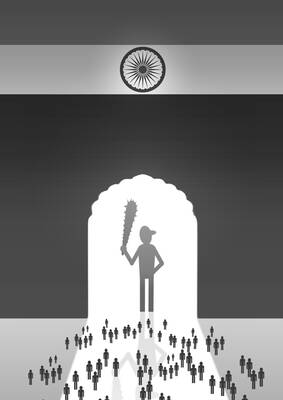Since the early days of the COVID-19 pandemic, we have been urged to follow the science. If you have been skeptical about new vaccine technologies or the need for lengthy lockdowns, you have likely had friends retort with advice from the WHO or the US Centers for Disease Control, or even quote an academic study or two.
However, there is one area where governments and societies at large have not followed the science — wearing masks outdoors.
For more than a year, scientists have continually found that SARS-CoV-2, including its Delta variant, is transmitted outdoors only in exceptionally rare circumstances. Where they did find such transmission was in crowded areas such as sporting events and concerts, which accounted for only 6 percent of cases before lockdowns occurred.
To catch COVID-19 in an everyday outdoor situation, a person would likely need to be face-to-face with a carrier who is coughing. Otherwise, the virus dissipates, blows away, drops to the ground or is neutralized by ultraviolet sunlight. It does not linger the way it does in an enclosed space.
If thousands of carriers are suspected to be roaming the streets, perhaps it is worth the abundance of caution to enforce outdoor mask rules and eliminate possibilities for chance transmissions.
However, Taiwan is not dealing with such numbers. New local infections totaled 212 in the past seven days, compared with 427 the week before. If the trend continues to halve each week, there should be fewer than 200 COVID-19 carriers left to discover before the outbreak is squelched.
The idea that any of these carriers will spread the virus while walking down the street or jogging in a park is not within reasonable scientific probability. A fluke outdoor transmission propelling the outbreak back into a crisis is even further out of realistic consideration.
What is shocking is that the Central Epidemic Command Center, in its easing of the level 3 COVID-19 alert on Thursday, kept the outdoor mask mandate in place while indicating that indoor dining is now safe. Although some jurisdictions are overriding that decision, the central government nonetheless seems to believe that the talking, coughing and sneezing that can accompany a meal — in a contained environment, often with poorly circulated air — poses no significant risk. That alone negates any argument for masking up on the street.
Wearing masks outdoors at this fading stage of the outbreak only reinforces false beliefs about how COVID-19 is transmitted, with profound results for mental and physical health.
Emotionally, the outdoor mask mandate creates paranoia regarding the air we breathe and the people we pass on the street. There is also the overlooked consequence of missing the smiles and facial cues of friends and neighbors, while having our noses blocked from the scents of our surroundings — the everyday aspects of life that provide a sense of belonging and connection.
Physically, masks reduce aerobic ability by 10 percent, which limits jogging, cycling and long walks to the healthiest individuals. Those who are less healthy or have underlying health conditions are the ones who have the most trouble being active in a mask and suffer more when they feel discouraged from going out.
The government should follow the science and let us put our masks back into our pockets when we are outside. It would make our communities healthier in a time of great anxiety.
Michael Riches is a copy editor at the Taipei Times.
During the long Lunar New Year’s holiday, Taiwan has shown several positive developments in different aspects of society, hinting at a hopeful outlook for the Year of the Horse, but there are also significant challenges that the country must cautiously navigate with strength, wisdom and resilience. Before the holiday break, Taiwan’s stock market closed at a record 10,080.3 points and the TAIEX wrapped up at a record-high 33,605.71 points, while Taipei and Washington formally signed the Taiwan-US Agreement on Reciprocal Trade that caps US tariffs on Taiwanese goods at 15 percent and secures Taiwan preferential tariff treatment. President William Lai (賴清德) in
As red lanterns adorn street corners and social media feeds teem with zodiac divinations, the Year of the Horse has arrived. In our hyper-accelerated age, the horse is almost exclusively synonymous with the idiom ma dao cheng gong (馬到成功) — “instant success upon arrival.” It is a linguistic shot of adrenaline, fueling the thrilling illusion that once the bell tolls, our lives would screech off into a cloud of dust, leaving all troubles behind. Yet, when examining the millennia-long partnership between humans and this magnificent “biological machine,” a different truth emerges. The true essence of the horse is not merely speed;
Chinese Nationalist Party (KMT) Deputy Chairman Hsiao Hsu-tsen (蕭旭岑) earlier this month led a delegation to Beijing to attend a think tank forum between the KMT and Chinese Communist Party (CCP). After returning to Taiwan, Hsiao spoke at length about “accumulating mutual trust” and letting matters “fall into place,” portraying the forum as a series of discussions focused on cooperation in tourism, renewable energy, disaster prevention, emerging industries, health and medicine, and artificial intelligence (AI). However, when the entire dialogue presupposes the so-called “1992 consensus — the idea that there is only “one China,” with each side of the Taiwan

India is getting richer every year, but its cities do not seem to be getting any more livable. Not because the country is too poor, or because leaders lack ambition, but because urban citizens are starved of funds and deprived of representation — and the government is in no hurry to fix it, even though people are dying as a result. Mumbai’s skyline is dotted with opulent glass towers, and it calls itself India’s commercial capital. The civic body, the Brihanmumbai Municipal Corp, is the country’s richest. Yet, residents have lived for years with no say in how their city was